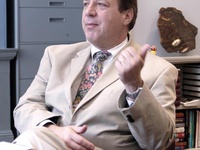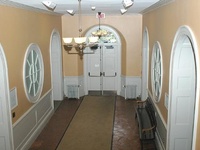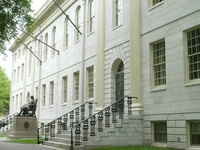The restructuring will streamline the layers of bureaucracy between Summers and undergraduate education.
The highest officers between Summers and the College are now Kirby, whom he hand-picked to head the Faculty last spring, and Gross, the tennis partner whom he also considered for the top spot in the Faculty of Arts and Sciences (FAS). This makes Gross the third link in the chain of command.
Restructuring may help Summers maintain his influence in the College by centralizing administrative power and diminishing the influence of Lewis, with whom he has clashed ideologically and personally on a number of occasions.
Summers took issue with a letter Lewis wrote to students in fall 2001 advising them that they can get “more out of Harvard by doing less.”
The two also butted heads during this spring’s debate about preregistration. Although he remained quiet about the matter in public, Lewis stood firmly against Kirby’s preregistration proposal, which Summers had backed until a Faculty vote demonstrated strong opposition to the plan.
Moreover, Lewis has been a constant supporter of extracurriculars—especially the College’s sports teams—and a vigilant advocate of student life, which flies in the face of Summers’ efforts to emphasize academics. Lewis’ departure from University Hall prevents the clash of personality and vision that characterized Summers’ first two years in office.
Lewis and Summers’ disputes are well-known among administrators, and many believe Summers was behind the firing.
According to one well-informed source, Summers made it clear to Kirby that he would not be unhappy if Lewis stepped down.
Kirby, Gross and Summers maintain that the dismissal had to do with administrative, rather than personal reasons.
“[Lewis] has done a superb job for eight years,” Kirby says. “Dean Gross will be a great successor to Dean Lewis. His job will be a difficult, broader job, but it will in a sense be an easier job because of what Lewis has done.”
But the fear of opposition from Lewis would explain why he was not asked to serve as dean during the transition to the new structure, despite his vast wealth of knowledge about Harvard.
“Why not use one of the experts to lead you into the future?” asks an incredulous Assistant Dean of the College Karen E. Avery ’87, whom Lewis appointed. One answer to her question is that Lewis’ expertise might have been more troublesome than anything else for Kirby and Gross.
This potential motivation has some worrying that the manner in which the restructuring occurred was less than careful. According to one well-informed source, details of the integration of the two offices have been considered haphazardly.
“Because it happened more suddenly than it needed to, the plans for reorganization and a successor were not well developed,” the source said.
This raises the question of why the administration would handle such a potentially volatile matter so hastily.
Read more in News
Pataki: 'Yale is Going to Crush Harvard'















